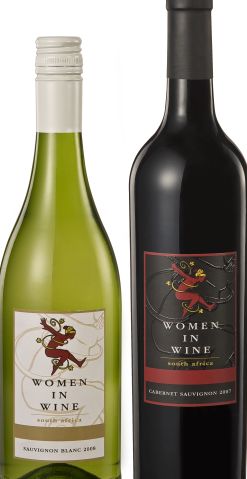
Women in Wine is export winner
Women in the Cape winelands are standing up to be counted, and are now producing their own wine, bottled under the label Women in Wine. A group of 20 women, all with backgrounds in the wine industry, formed the company seven years ago, with “the dream of giving women, especially farm workers and their families, a […]


(Image: Women in Wine)
Women in the Cape winelands are standing up to be counted, and are now producing their own wine, bottled under the label Women in Wine.
A group of 20 women, all with backgrounds in the wine industry, formed the company seven years ago, with “the dream of giving women, especially farm workers and their families, a share in the industry”. With varied skills in marketing, wine analysis, finance, development and training, and social responsibility, the one thing the partners all had in common was that they all “enjoy a glass of quality wine”.
Women in Wine is the first wine-producing company that is owned, controlled and managed entirely by women. “To date, women have made a significant contribution to the Cape’s wine industry without receiving recognition or benefiting from the industry’s business opportunities,” says Beverly Farmer, a founder member and the chief executive.
Embracing change
The company has several unique features. “Women in Wine embraces change in an industry which is 365 years old,” explains Farmer. “We are the first company owned, controlled and managed by women, and black women in particular.”
The partners are all too aware that seasonal workers, who are often women, are unemployed for the rest of the year. The company strives to create a second source of income for these women by identifying “skills development and training opportunities in collaboration with other organisations”.
A Women’s Workers’ Trust has been set up, which has shares in the company. Women in Wine also works closely with organisations like the South African Wine Industry Trust. This trust aims to restructure the wine industry to represent the interests of all those involved more effectively, in particular the farm workers, by building a shared consciousness through providing information, platforms for dialogue, education and co-ordination, and by promoting ethical trading.
Women in Wine is also a founder member of the African Vintner Alliance, a joint action group established three years ago for the growth of black businesses in the wine industry. “During this period we have worked hard to establish a foothold in this traditional industry by working in collaboration with each other to enter and develop new markets,” states Farmer.
Women in Wine only sources wine from farms that comply with socio-economic legislation with specific reference to ethical and environmental practices, employment conditions, skills development and training, as well as that address aspects of black economic empowerment.
Ready overseas market
The group has found a ready overseas market for its product. It produces six wines: a sauvignon blanc, cabernet sauvignon, chardonnay, cabernet sauvignon/shiraz, pinotage rose, and chardonnay chenin blanc. The wines are exported to the US, China, Ireland, Spain, Sweden and Denmark, and are available locally in Makro stores nationwide. They can also be ordered online from the Women in Wine website.
Some of its export destinations have their own well-established wine industries but they have embraced the Women in Wine label. Farmer believes the reason for this is that importers are interested in the story behind the brand. “The partnership between professional women and farm worker women is a truly South African story.”
Two years ago, Women in Wine was nominated in the category Ethical Business Award by the prestigious international magazine, The Drinks, in the UK.
Creative solutions
Women in Wine has recognised that there are other ways of producing wine. The company was established without the huge capital investment needed for a traditional vineyard with rows of vines stretching into the distance, and a vast cellar. Instead, it has entered into partnerships with existing cellars, as well as with bottling and packaging companies, to produce its wine.
“In order to achieve our vision of contributing to the transformation of the South African wine industry, we have had to come up with creative solutions that break with traditional perceptions that to produce excellent wines you have to have land, vineyards, cellars and a big company for exports. Instead we have invested in the building of the Women in Wine brand,” explains Farmer, who has a journalism degree and worked on wine farms, representing farm workers and their families, before she became chief executive of Women in Wine.
One such partnership is with Boland Kelder, which is the group’s leading wine supplier. Its product development team, with well-known international wine makers on the panel, made Women in Wine’s first two Eden’s Vineyards wines to its specifications.
In 2011, the South African wine industry had more than 3 500 wine producers, with 582 wine cellars, and 100 000 hectares under vine. In that year, 831-million litres of wine were produced in the Western Cape. In 2012, over 400-million litres of wine were exported, with the UK and Germany taking the biggest slice, at 22% and 19%, respectively.
The wine industry in South Africa goes back 350 years, when the Dutch governor, Jan van Riebeeck, produced the country’s first wine in 1659.
By: Lucille Davie
Source: www.mediaclubsouthafrica.com
